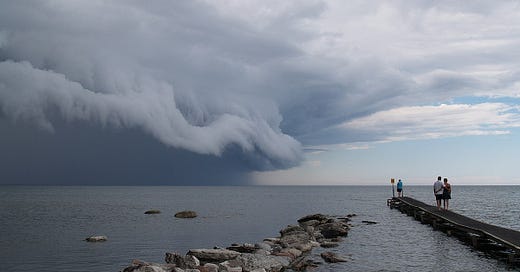‘Herrens Veje’ (‘Ride upon the storm’ DR Drama)
There are times when a story digs into your psyche and won’t go away.
A couple of years ago in our household, we spent a few weeks – occasionally but not regularly – more than an hour at a time, watching a searing bit of Danish television. Called “Ride upon a Storm” in English, a more evocative title than (translated directly) “The Lord’s Way” in Danish, this 2017-18 two-season series enacts a “fiction of ideas” but then explores how those ideas crumble under complex changes in society, when the intellectual and emotional anchors of a society system lose their moorings. It takes an idea – Christian faith a guilt it induces – and sets it against the decline of mainstream religion, the mercantilism of the church hierarchy (property values, fiddling the books) and the growth of the Muslim population in a once solidly Christian and now-doubt-filled country. You don’t need to be religious to get drawn into this story. Just human.
The plot involves a family, for many generations the font of a successions of priests. Now, however, the family seems to be dissolving (Series 1) and then teetering on collapse (start of Series 2). Younger son, August, the latest generation of priests, steps in front of a truck at the end of Series 1, lured into the road by the ghost of a Muslim woman he killed while serving as a priest for the troops fighting in Afghanistan. He has reluctantly picked up a gun when his troops come under attack and shoots at what he concludes is a suicide bomber dressed in women’s clothing. The person is, he soon discovers, a mother trying to save her children.
At the start of Series 2, August’s father is fighting the bishop’s proposed sale of August’s old church for conversion to a mosque. The older son, Christian, is in Denmark again, making a living writing books and selling a new age spirituality after returning from his own spiritual crisis in Series 1, when he went to Nepal and became something of a Buddhist. There are more layers, too.
This is a character-led exploration of a sociological and philosophical confrontation between competing ideas of religion that challenge the possibility of escaping the challenges uncertainty through religion. The series is both psychological and philosophical, the plot isn’t complex, but the ideas are. And the framing device of music – I can’t get the theme out of my head. I didn’t sleep well after watching it. But the experience is well worth – intellectually and aesthetically – the restless nights it can induce.




